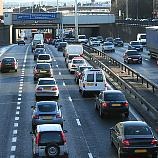(BRUSSELS) – The EU Council gave its green light Tuesday to further reduction in emissions from road transport with stricter CO2 emission performance standards for new cars and vans.
The new rules aim to reduce emissions from road transport that has the highest share of emissions from transport – and provide the push for the automotive industry to shift towards zero-emission mobility while ensuring continued innovation in the industry. The new rules set the following targets:
- 55% CO2 emission reductions for new cars and 50% for new vans from 2030 to 2034 compared to 2021 levels
- 100% CO2 emission reductions for both new cars and vans from 2035
A regulatory incentive mechanism for zero- and low-emission vehicles (ZLEV) will be in place from 2025 until the end of 2029. As part of this mechanism, if a manufacturer meets certain benchmarks for the sales of zero- and low-emission vehicles it can be rewarded with less strict CO2 targets. The benchmark is set at 25% for cars and 17% for vans.
The regulation contains a reference to e-fuels, whereby following a consultation with stakeholders, the Commission will make a proposal for registering vehicles running exclusively on CO2-neutral fuels, after 2035, in conformity with EU law, outside the scope of the fleet standards, and in conformity with the EU’s climate neutrality objective.
A review clause foresees that in 2026 the Commission will assess the progress made towards achieving the 2035 100% emission reduction targets and the possible need to review them. The review will take into account technological developments, including with regard to plug-in hybrid technologies and the importance of a viable and socially equitable transition towards zero emissions.
In addition, the regulation includes other provisions such as:
- gradually reducing the cap of emission credits that manufacturers can receive for eco-innovations that verifiably reduce CO2 emissions on the road, to maximum 4g/km per year from 2030 until the end of 2034 (currently set at 7g/km per year)
- a common EU methodology, to be developed by the Commission by 2025, for assessing the full life cycle of CO2 emissions of cars and vans placed on the EU market, as well as for the fuels and energy consumed by these vehicles
The regulation maintains a derogation for small volume manufacturers until the end of 2035.
The regulation will now be published in the EU’s Official Journal and enter into force on the twentieth day following that of its publication.


